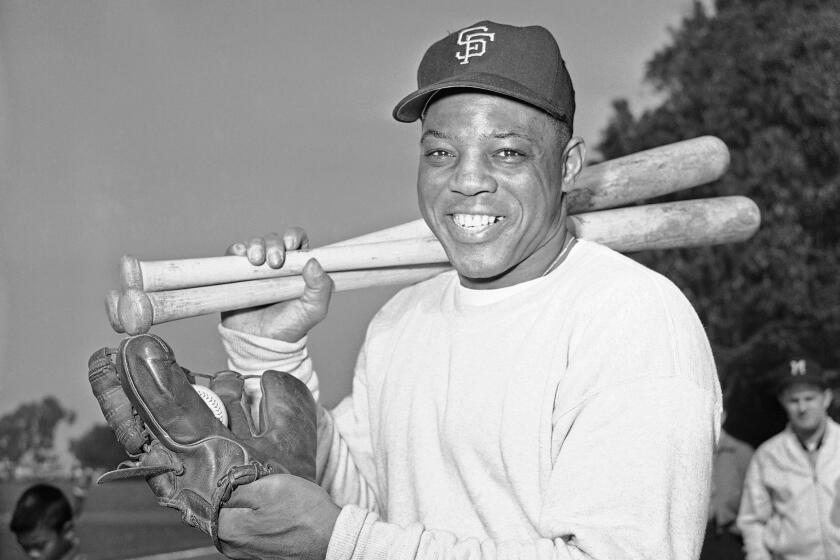To Live and Die in L.A.
In a lot of ways, Dennis Cole is a living metaphor for L.A. He’s tall, he’s blond, he’s good-looking and he’s an actor.
If you saw his face, you’d say, sure, I know him, he was on “The Young and the Restless” or “The Fall Guy” or “Fantasy Island,” and you’d be right.
Cole has been an actor for 25 years and, unlike most who claim the title, he’s a working actor, with the kind of credits that make an agent smile.
Then why does he sit in a quiet Westside condo, with sunlight gleaming in the window, and say to me, “The greatest role I ever played was pretending I wanted to be alive?”
It’s because of his son Joey.
It is almost three years to the day since Joey was shot dead near the doorstep of his Venice apartment on the kind of balmy L.A. night when no one ought to die.
He and a friend were coming home from the store with bags full of groceries when two thugs killed Joey for the $20 he had in his pocket.
“Not a day goes by that I don’t think about him,” Cole says, holding a photograph of them together arm in arm. “I wanted to die, too.”
Joey was 30 when he was murdered. His picture shows a man two inches taller than his six-foot-two dad and almost as handsome.
“It was never easy for him being a celebrity’s son,” Cole says, looking quickly away from the photograph. “He was just putting things together when . . . “
He doesn’t finish the sentence.
*
There are about a thousand murders a year in L.A. This year, for the first time since 1989, the figure may dip below that mark. The six-month total of 378 homicides is slightly below last year’s.
The number includes not only thugs and gangbangers, but old ladies and ice cream vendors. It includes kids walking their dogs, and fathers carrying their babies. It includes mothers and brothers and people like us.
At another time, Dennis Cole might have played the kind of role he’s living now, that of a father whose grief covers him like a funeral shroud.
He won’t do that anymore. He won’t take roles based on violence. More than most, he understands the relationship of make-believe to reality. He did an episode for “Police Story” once, and three copycat crimes followed the crime depicted on the show.
He doesn’t want to be a part of anything that might contribute to the statistics of murder. Especially to a statistic like Joey.
He thinks about Joey at night and he thinks about him in the daytime. Memories flash at him like a movie montage of a kid’s life: changing his diapers, riding the roller coaster, playing doubles in tennis.
He sees a Joey struggling to find his way, emerging slowly from being a celebrity’s son to being something on his own, a documentary filmmaker with promise. “He was putting together the story of a rock band on the road when he was killed,” Cole says. Softly: “He had a future.” Dec. 20, 1991. Dennis Cole was asleep when his telephone rang at 6 a.m. It was a friend who had been listening to the radio. He said, “I’ve got awful news . . . “
*
It seems dreamlike now as Cole looks back on it, a sleepwalk through the sad process of identifying Joey’s body, of gathering his things and of seeing his son lowered into a grave in the Hollywood Hills.
“It’s strange,” Cole says. “You become like a leper. People avoid you, afraid that some of the tragedy might somehow rub off on them.”
He couldn’t shake his comatose state. On the first anniversary of Joey’s death, he drove to the street where his son was killed and sat there for hours, hearing Joey’s laughter, seeing Joey’s life.
Then, as he emerged, it became critical for him to find the murderer. He badgered the police to solve the crime, and appeared on show after show in his quest to find the killer: “Hard Copy,” “Prime Suspect,” “Murder One.”
But the person who broke a calm, moonlit night with gunfire three years ago was never found, and the likelihood is, he never will be.
Today, in Joey’s memory, Cole is working to create an organization called Wake Up America. Its intent is to eliminate violence on television, to get guns off the street, to streamline the criminal justice system and to counsel crime’s victims.
“I’ve got to do something,” he says, dropping from the enthusiasm of his new effort to the melancholy reality on which it is based. “It’s a role I never wanted.”
I wished him well that bright autumn day, but I know how difficult it’s going to be for others to feel his pain. Only those with a statistic like Joey will ever understand.
